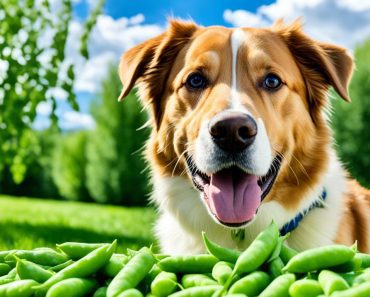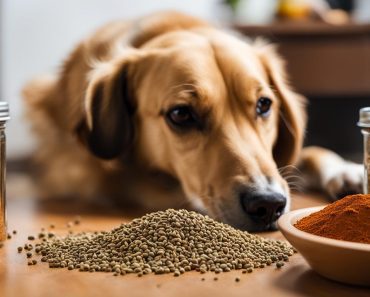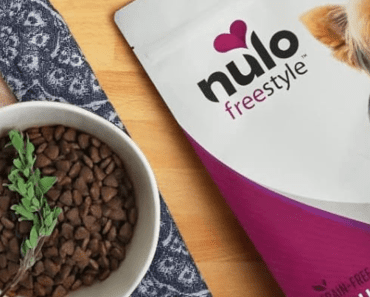As a pet owner, I’ve often wondered about the safety of feeding avocados to my furry friend. After doing some research, I discovered some interesting facts about avocado toxicity in dogs and the potential risks involved. So, let’s dive in and explore whether dogs can safely enjoy this trendy fruit.
Now, you might be thinking, “Can dogs eat avocado?” Well, the answer isn’t as straightforward as you might think. Avocados contain a compound called persin, which is a fungicidal toxin. While dogs are generally more resistant to persin, it’s still best to exercise caution.
The high fat content found in avocado flesh can lead to gastrointestinal upset and weight gain in dogs. Additionally, the avocado pit can pose a choking hazard, making it important to keep avocados out of your dog’s reach.
While avocados may not be the best choice for our four-legged friends, there are plenty of safe fruits for dogs to enjoy. From crunchy carrots to sweet berries, there are several alternatives that offer similar health benefits without the risks.
In the following sections, we’ll delve deeper into the specifics of avocado toxicity and risks for dogs, explore the use of avocado oil in canine diets, and discuss the dangers of avocado pits. We’ll also touch upon the presence of avocados in commercial dog food and provide a list of safer fruit and vegetable alternatives for dogs.
So, stick around to unravel the mystery of avocados and their suitability for our beloved canine companions.
Can Dogs Have Avocado?
When it comes to avocado and dogs’ health, it’s important to exercise caution. While dogs can technically have avocado in small amounts, it’s best to avoid it due to the presence of persin, a toxin that can be harmful to dogs. Even though dogs may be more resistant to persin toxicity compared to other animals, there is still a potential for gastrointestinal issues. The high fat content in avocado flesh can lead to gastrointestinal upset and weight gain in dogs, while the avocado pit poses a choking hazard.
Instead of giving your furry friend avocado, there are plenty of other fruit and vegetable options that offer similar health benefits without the risks. Some safe alternatives include celery, peas, green beans, carrots, and certain berries. These can be given to dogs in moderation, but it’s important to remove any seeds, pits, or skins before offering them. Always monitor your dog for any adverse reactions or changes in their health when introducing new foods to their diet.
Before making any dietary changes, it’s recommended to consult with a veterinarian. They can provide guidance specific to your dog’s health and help you make informed decisions about their nutrition. Remember, a balanced and nutritious diet is essential for your dog’s overall well-being, so it’s important to choose dog-friendly alternatives to provide them with the nutrients they need.
Avocado Toxicity and Risks for Dogs
Avocado contains a toxin called persin that can be harmful to dogs. While dogs are generally more resistant to persin toxicity compared to other animals, it’s still important to exercise caution and avoid feeding avocados to them. The highest concentration of persin is found in the leaves, skin, and pit of the fruit.
Ingesting large amounts of avocado can lead to vomiting, diarrhea, and potential heart damage in dogs. The high fat content of avocado flesh can also result in gastrointestinal upset and weight gain. Additionally, the avocado pit poses a choking hazard and can cause a potentially dangerous gastrointestinal obstruction.
The Risks of Feeding Avocados to Dogs
Feeding avocados to dogs can have several risks and potential health consequences. Some dogs may experience immediate reactions such as vomiting or diarrhea after ingesting avocado, while others may develop more serious long-term health issues over time.
It’s important to be aware of these risks and educate yourself and your household members about the dangers of feeding avocados to dogs. By choosing safer alternatives and consulting with a veterinarian, you can ensure the well-being of your furry friend and avoid any unnecessary health complications.
Avocado Alternatives for Dogs
While avocado may not be an ideal food for dogs, there are plenty of alternative fruits and vegetables that can provide similar health benefits without the associated risks. Dog-friendly options include celery, peas, green beans, carrots, and certain berries, among others.
When introducing new foods to your dog’s diet, it’s important to remove any seeds, pits, or skins before offering them. Always monitor your dog for any adverse reactions or changes in their health when incorporating new foods, and consult with your veterinarian for personalized dietary advice.
Avocado Oil and Dogs
Avocado oil can be a beneficial addition to a dog’s diet. It offers several health benefits, including reducing inflammation. Unlike the flesh and pit of the avocado, avocado oil does not contain persin, the toxin that can be harmful to dogs. However, due to its high-fat content, it’s important to exercise caution and consult with a veterinarian before administering avocado oil to your dog.
When using avocado oil, it’s essential to introduce it gradually and in moderation. This allows your dog’s digestive system to adjust to the new addition. Additionally, monitoring your dog for any adverse reactions or changes in their health is crucial. Every dog is different, and some may have sensitivities or allergies to certain oils, including avocado oil.
Before incorporating avocado oil into your dog’s diet, it’s recommended to consult with your vet. They can provide guidance on the appropriate amount of avocado oil to give to your dog based on their breed, size, and overall health. They can also help determine if avocado oil is the best choice for your dog or if there are alternative oils that may be more suitable.
Avocado Pit Hazards for Dogs
When it comes to feeding avocados to dogs, it’s not just the flesh that can pose a danger. The avocado pit can also be hazardous and potentially lead to serious health issues. The pit of an avocado is hard and can present a choking hazard for dogs, especially small breeds or those prone to gulping their food. Additionally, if a dog manages to swallow the pit, it can cause a gastrointestinal obstruction, which may require emergency surgery to treat.
To keep your furry friend safe, it’s crucial to take preventive measures. Make sure to keep avocados, including the pit, out of reach from your dog. If you suspect that your dog has ingested an avocado pit, it’s essential to contact your veterinarian immediately for guidance. They will be able to assess the situation and advise on the necessary steps to ensure your dog’s well-being.
In the unfortunate event that your dog does experience an avocado pit-related emergency, remember to stay calm and follow your veterinarian’s instructions. Acting promptly and seeking professional help is crucial in such situations to prevent any further complications. By being proactive and educated about the hazards related to avocado pits, you can help safeguard your dog’s health and well-being.
Preventing Avocado Pit Accidents
It’s important to take steps to prevent accidents involving avocado pits and your furry companion. Here are some tips to keep in mind:
- Store avocados safely: Keep avocados out of reach and securely stored so that your dog can’t access them.
- Dispose of pits properly: When discarding avocado pits, make sure to place them in a secure trash bin or dispose of them in a way that your dog cannot get to them.
- Supervise your dog: When enjoying avocados or any other food that contains them, make sure to supervise your dog to prevent any accidental ingestion of pits.
By following these precautions, you can minimize the risks associated with avocado pits and ensure your dog’s safety. Remember, prevention is key when it comes to keeping your furry friend out of harm’s way.
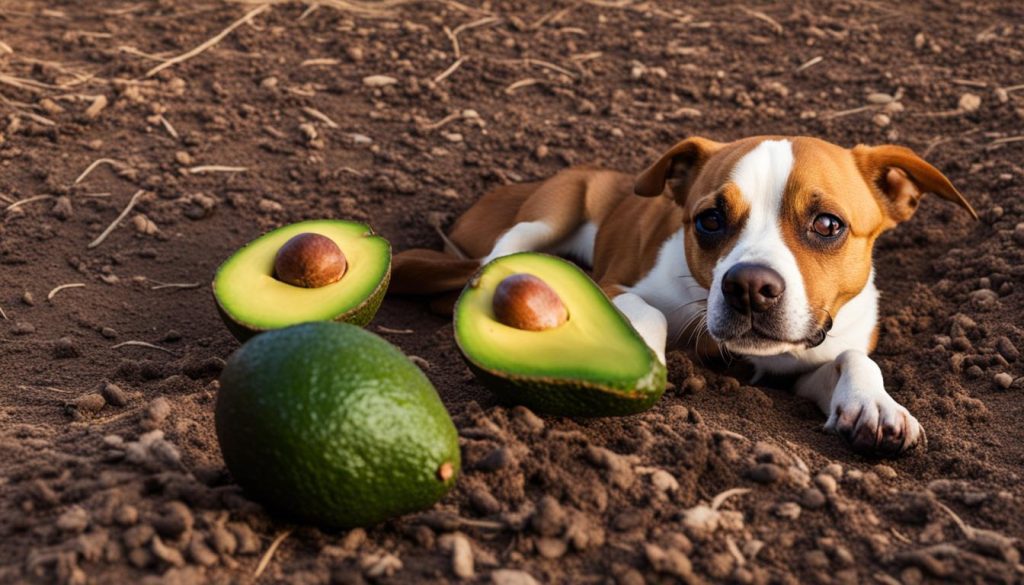
Avocado in Commercial Dog Food
When it comes to commercial dog food, you may come across products that contain avocado oil or avocado meal as ingredients. These formulations are carefully crafted to include safe levels of avocado components that can offer health benefits to dogs, such as healthy fats, vitamins, and fiber. The inclusion of avocado in commercial dog food is based on its potential to contribute to a dog’s overall well-being.
It’s important to note that not all commercial dog food brands incorporate avocado, and it’s crucial to choose reputable brands that prioritize the quality and safety of their ingredients. Reading labels and understanding the nutritional content of the dog food you’re considering is essential.
Avocado in Commercial Dog Food Benefits
Avocado in commercial dog food can provide a source of healthy fats, which are essential for a dog’s overall health. These fats can contribute to a shiny coat, healthy skin, and proper cell function. Avocado also contains vitamins and minerals that can support a dog’s immune system and promote a healthy digestive system. The fiber content in avocado can aid in maintaining regular bowel movements.
However, it’s always advisable to consult with your veterinarian before incorporating any new dog food into your pet’s diet. They can provide guidance on the appropriate portion sizes and address any concerns or considerations specific to your dog’s health and nutritional needs. Additionally, observing your dog’s response to avocado-containing dog food is important, as some dogs may have individual sensitivities or allergies.
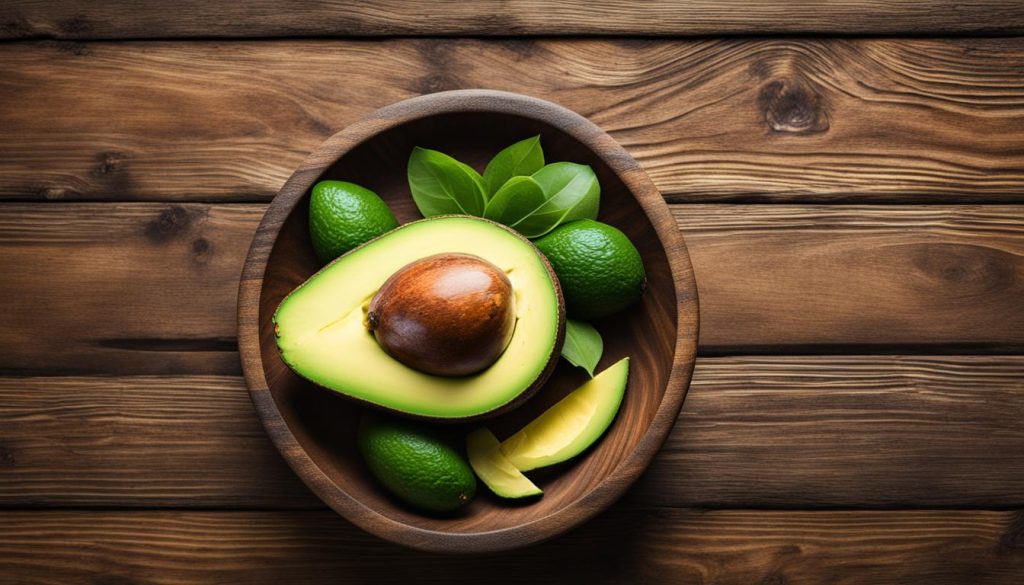
In conclusion, while avocado can be found in some commercial dog food products and offer potential health benefits, it’s crucial to choose trusted brands and consult with a veterinarian. Each dog is unique, and their dietary needs may vary, so professional guidance ensures the right balance of ingredients for your furry friend’s overall well-being.
Safer Fruit and Vegetable Alternatives for Dogs
If you’re concerned about the potential risks of feeding avocados to your dog, there are plenty of safe and nutritious alternatives you can offer. These fruits and vegetables provide essential vitamins and minerals while reducing the risk of digestive issues and toxicity. Remember to introduce new foods gradually and in moderation to avoid any adverse reactions.
1. Celery
Celery is a crunchy and hydrating snack that dogs can enjoy. It is low in calories and contains beneficial nutrients like vitamins A, C, and K. Additionally, the high fiber content in celery can promote healthy digestion in dogs. Just make sure to cut the celery into bite-sized pieces to prevent choking hazards.
2. Peas and Green Beans
Peas and green beans are excellent sources of vitamins, minerals, and fiber for dogs. These vegetables can be served cooked or raw, but it’s important to avoid seasoning or adding any harmful ingredients like garlic or onion powder. Peas and green beans can be a great addition to your dog’s diet as long as they are prepared and served plain.
3. Carrots
Carrots are a popular and nutritious treat for dogs. They are rich in beta-carotene, which converts to vitamin A in the body and contributes to a healthy immune system and good vision. Carrots are also low in calories and high in fiber, making them a great option for dogs looking to maintain a healthy weight. Serve carrots raw or cooked, and consider cutting them into smaller pieces for easier chewing.
4. Berries
Certain berries, such as blueberries and strawberries, are safe and tasty for dogs. These fruits are packed with antioxidants, which can help support a dog’s overall health. Blueberries are especially beneficial, as they contain compounds that may help improve cognitive function in older dogs. Serve berries fresh or frozen as a refreshing snack or mix them into your dog’s meals for added variety.
By incorporating these safe fruit and vegetable alternatives into your dog’s diet, you can provide them with a diverse range of nutrients, antioxidants, and fiber. Remember to always monitor your dog for any adverse reactions and consult with your veterinarian if you have any concerns or questions about introducing new foods to your pet’s diet.
Key Takeaways: Can Dogs Eat Avocado?
After examining the potential risks and benefits of feeding avocados to dogs, it’s clear that caution should be exercised. While dogs can technically consume small amounts of avocado, it’s best to avoid it due to the potential toxicity of persin and the high-fat content. Avocado pits can also pose a choking hazard and cause gastrointestinal blockages, which can be life-threatening for our furry friends.
As responsible dog owners, it’s essential to educate ourselves and our household members about the risks associated with feeding avocados to dogs. By understanding the potential dangers, we can make informed decisions about the food we offer our four-legged companions.
Fortunately, there are plenty of dog-friendly human foods that provide similar health benefits without the risks. Fruits and vegetables such as celery, peas, green beans, carrots, and certain berries can be given to dogs in moderation. Just remember to remove any seeds, pits, or skins before offering them to your furry friend. It’s always wise to consult with a veterinarian before introducing any new foods to your dog’s diet.
In conclusion, while avocados may be tantalizing to our taste buds, they’re best left off the menu when it comes to our canine companions. By choosing dog-friendly alternatives and seeking guidance from professionals, we can ensure that our dogs stay healthy and happy without compromising their well-being.
FAQ
Can dogs eat avocado?
Dogs can technically eat small amounts of avocado, but it’s best to avoid it due to the presence of persin, a toxin that can be harmful to dogs. Avocado flesh’s high fat content can also lead to gastrointestinal upset and weight gain in dogs. It’s best to choose dog-friendly alternatives.
Is avocado toxic to dogs?
Avocado contains persin, a fungicidal toxin that can cause serious health problems in many animals, including dogs. While dogs may be more resistant to persin, it’s still recommended to avoid feeding avocados to them due to the potential risks of gastrointestinal issues and choking hazards.
Are there safe fruits for dogs?
Yes, there are several safe fruits for dogs, such as celery, peas, green beans, carrots, and certain berries. It’s important to remove any seeds, pits, or skins before offering these fruits to your dog. Always monitor your dog for any adverse reactions or changes in their health when introducing new foods.
Can dogs have avocado oil?
Avocado oil is considered safe for dogs and can offer health benefits, such as reducing inflammation. However, due to its high fat content, it’s important to consult with a vet before administering avocado oil to your dog. Introduce new oils or supplements gradually and in moderation.
What are the risks of feeding avocados to dogs?
Ingesting large amounts of avocado can lead to vomiting, diarrhea, and potential heart damage in dogs. Avocado pits can also be a choking hazard and cause gastrointestinal blockages. It’s important to educate yourself and others in your household about these risks and choose dog-friendly alternatives.
Can dogs eat avocado in commercial dog food?
Some commercial dog foods may contain avocado oil or avocado meal as ingredients. These products are formulated to include safe levels of avocado components, such as healthy fats, vitamins, and fiber, which can benefit a dog’s overall health. However, it’s important to choose reputable brands and consult with your vet before incorporating any new dog food into your pet’s diet.
What are the key takeaways when it comes to dogs and avocado?
It’s best to avoid feeding avocados to dogs due to the potential risks associated with persin and the high-fat content. Avocado pits can be a choking hazard and cause gastrointestinal blockages. There are safer alternatives available for dogs to enjoy, such as celery, peas, green beans, carrots, and certain berries. Always consult with a veterinarian before introducing any new foods to your dog’s diet.

